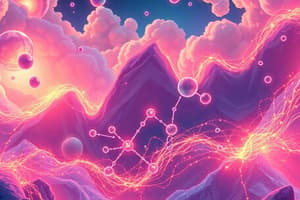Podcast
Questions and Answers
What factor influences the reaction rate the most?
What factor influences the reaction rate the most?
- Temperature
- Catalyst presence
- Activation energy
- Reactant concentration (correct)
Which factor leads to slower reactions when it is higher?
Which factor leads to slower reactions when it is higher?
- Reactant concentration
- Catalyst presence
- Temperature
- Activation energy (correct)
What type of equilibrium occurs when forward and reverse reactions happen at the same rate?
What type of equilibrium occurs when forward and reverse reactions happen at the same rate?
- Static equilibrium
- Dynamic chemical equilibrium (correct)
- Stagnant equilibrium
- Reactive equilibrium
In reversible reactions, what happens simultaneously?
In reversible reactions, what happens simultaneously?
What role does reactant concentration play in reaction rate?
What role does reactant concentration play in reaction rate?
Which side can equilibria strongly favor in a specific reaction?
Which side can equilibria strongly favor in a specific reaction?
What is activation energy in a chemical reaction?
What is activation energy in a chemical reaction?
In reversible reactions, what occurs when dynamic chemical equilibrium is achieved?
In reversible reactions, what occurs when dynamic chemical equilibrium is achieved?
How do equilibria in chemical reactions strongly favor one side over the other?
How do equilibria in chemical reactions strongly favor one side over the other?
Why do our bodies maintain equilibrium in many reactions?
Why do our bodies maintain equilibrium in many reactions?
Study Notes
- Chemical reactions are influenced by factors like reactant concentration, temperature, and catalyst presence.
- Reactant concentration plays a crucial role in reaction rate, with higher concentrations leading to faster reactions.
- Activation energy is the energy required for a reaction to occur, with higher activation energy leading to slower reactions.
- Most chemical reactions are reversible, with forward and reverse reactions happening simultaneously.
- Dynamic chemical equilibrium occurs when the rates of forward and reverse reactions are equal, leading to constant concentrations of reactants and products over time.
- Equilibria can strongly favor either the products or the reactants, depending on the specific reaction.
- Our bodies maintain equilibrium in many reactions to ensure survival, favoring one side over the other.
Studying That Suits You
Use AI to generate personalized quizzes and flashcards to suit your learning preferences.
Description
Test your knowledge on factors influencing chemical reactions, activation energy, reversible reactions, dynamic chemical equilibrium, and reaction favorability. Explore how our bodies maintain equilibrium in reactions for survival.




